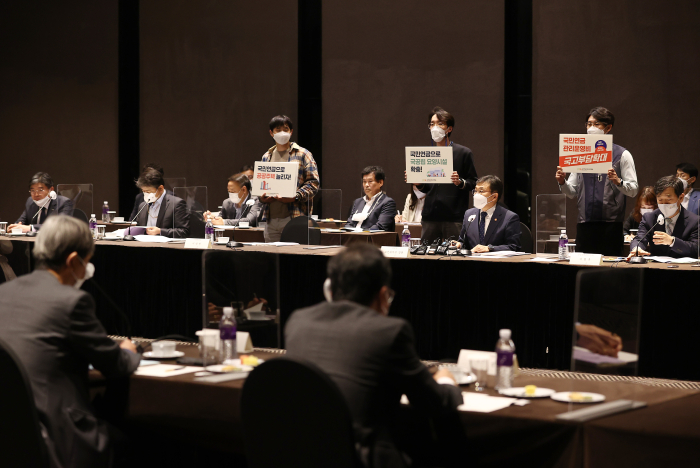NPS adopts limited negative screening on high emitters
Detailed action plans, standards to be decided after studies
By May 28, 2021 (Gmt+09:00)
Samsung shifts to emergency mode with 6-day work week for executives


CJ CheilJedang to sell feed, livestock unit for $1.4 bn


Samsung Electronics' key M&A man returns; big deals in the offing


Affinity to buy SK Rent-a-Car at $572 mn, more deals expected


Keppel REIT to sell Seoul-based prime office T Tower



South Korea's National Pension Service (NPS) decided on Friday to exclude from its portfolio new coal-fired power development projects both at home and abroad, introducing negative screening but to a narrower range than the earlier proposal, that extended to the entire coal industry.
It was the first official declaration by the world's third-largest pension scheme to contribute to reducing greenhouse gas emissions. With Friday's decision approved by its Investment Management Committee, the NPS became the first Korean pension fund to adopt negative screening on high emitters.
The NPS said that it will apply the system to new coal projects, once it sets the standards and specifies the scope of companies subject to the screening system, as well as its impact on markets. It will outsource the relevant studies from the second half of this year.
Negative screening is a practice in responsible investing to exclude, or curtail investments in industries or companies with low ratings based on environmental, social and governance (ESG) standards.
Last month, the $775 billion pension fund postponed a decision on the negative screening introduction, citing a lack of standards of defining coal-related companies and its possible negative impact on financial markets.

Market speculation has been that KEPCO, POSCO Co. and petrochemical companies including GS Caltex Corp., LG International Corp., Doosan Heavy Industries & Construction Co. and Kumho Petrochemical Co. could be negatively affected by negative screening.
But given that many of them also run eco-friendly energy businesses, it could be difficult for the NPS to completely withdraw from them.
Several global pension funds have already been carrying out negative screening to exclude, or restrict investments in companies engaging in coal mining and development as well as manufacturing weapons of mass destruction and tobacco.
But their stance on carbon emitters varies, with many of them applying strict standards.┬Ā
Among major pension schemes, it is only Norges Bank Investment Management (NBIM), Sweden's national AP pension funds and CalPERS that explicitly exclude coal power-related companies from their portfolios, according to the NPS.
The Canada Pension Plan Investment Board (CPPIB) does not carry out negative screening to exclude companies and sectors that do not comply with ESG standards so that the pension scheme will not miss out on good investment opportunities, said its Asian operations head Suyi Kim on May 26
Write to Jung-hwan Hwang at jung@hankyung.com
Yeonhee Kim edited this article.
-
 ESG investingNPS shelves plan for negative screening on high emitters
ESG investingNPS shelves plan for negative screening on high emittersApr 30, 2021 (Gmt+09:00)
4 Min read


